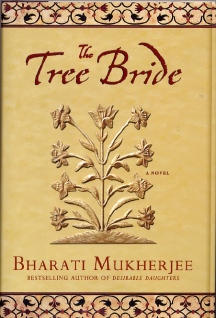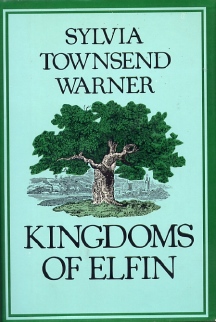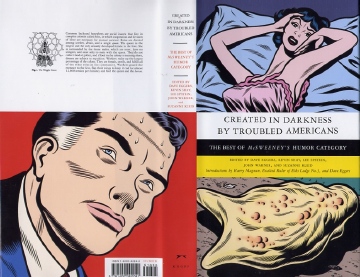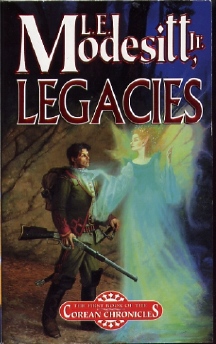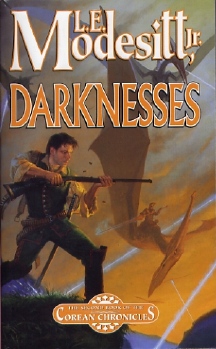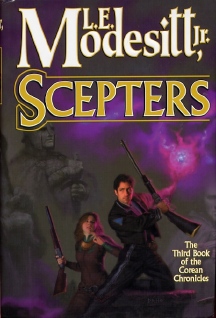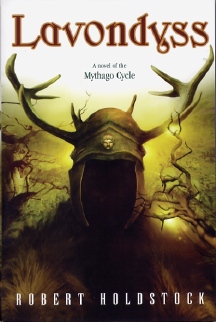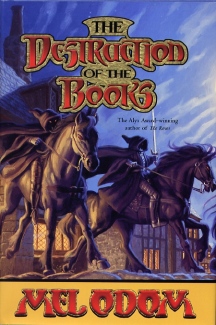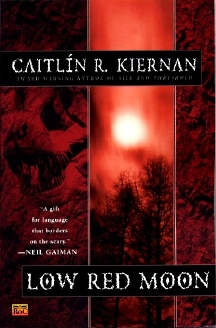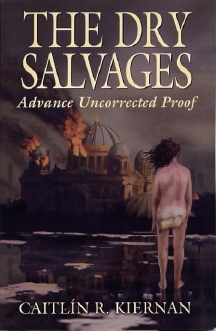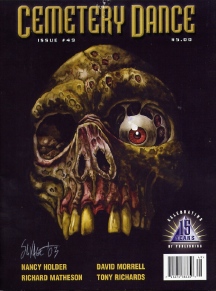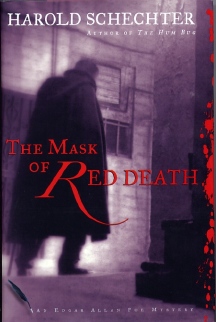|
|
|
This Just in..News from the Agony Column
|
07-30-04: My Mini-Life In the Bush of Books, Part 2 |
||||||||||||
'The
Tree Bride' by Bharati Mukherjee, Finding 'Kingdoms of Elfin' by Sylvia
Townsend Warner, and 'Created in Darkness by Troubled Americans' by
a Bunch of Funny People Including The Ever-Meaningful Dave Eggers
I'd frankly thought that as acclaimed as the writers might be, well, the stories wouldn't be compelling to my tiny brain. And as usual, I was wrong. 'The Tree Bride' begins with the firebombing of Tara Chatterjee's apartment. A chance meeting at a subsequent doctor's appointment sends her on a quest to find her roots, to learn who she truly is. Her task requires her to trace the tale of Tara Lata, her great-great aunt who was married to a tree at the age of five in the Indian village of Mishtigunj. Now this is a story I can sink my tiny brain into. A look for family roots and a journey through the generations compelled by a violent attack in the present. Readers who pick up this book will find beautiful, lush prose and a short novel that will enfold them in another culture. The protagonist will not be safe until Abbas Sattar Hai is out of her life. At a mere 290 pages, 'The Tree Bride' looks to offer a lot of mileage for a small investment of reading time, and to add hundreds of complex angles to one of the best recent science fiction titles. Every Friday, I give myself about a half a day off, to leave the house, the keyboards -- but not the books -- behind. That's when I manage to get out into the world and especially the world of actual books in actual bookstores, including my favorite local used bookstores. Last week, I had the pleasure of finding a first edition (second printing, however) F/NF copy of one of my very favorite books, 'Kingdoms of Elfin' by Sylvia Townsend Warner. Back in the earliest of early days, when I lived in Redondo Beach, when I was first buying the hardcover versions of H. P. Lovecraft's Arkham House books, when all my books fit on about three four-foot wide shelves, one of the books I owned and read most enthusiastically was this collection of short stories.
But I never even thought about the possibility of a hardcover first edition until last week, when one showed up at Logos Books. And even though it's a second printing, having a hardcover, easy-to-read copy of this wonderful collection is a real boon. Why? Forget all the first-ed magic. What matters most is that the stories here were then and still now seem to me to be ground-breaking fantasy fiction, superbly well-written, passionate and imaginative. Warner achieves this high quality by taking her subject totally seriously and following the consequences of the existence of faeries in the backwoods of New York, a sort of brightened version to Lovecraft's dark and dank forests. This is not to say that the stories are lightweight. The writing here is literary, but the focus is on realistically created creatures of myth populating and co-operating in modern America. Each of the stories is immensely readable and-re-readable. Moreover, they're accessible to a wide audience. They're just tales of characters who happen to be faeries and live in a society that borders ours. What surprised me most then -- and still does now-- is that these stories, each and every one, first found publication in The New Yorker. Now, this magazine isn't a stranger to weird fiction; back in March of this year, we saw a story by Jonathan Lethem appear. But to publish an entire collection's worth of stories that cannot be construed as anything other than fantasy is not what we'd expect of America's premiere weekly literary magazine.
McSweeney's guru Dave Eggers has his head screwed on straight enough to know that not all humorous writing is in jokes, or the "obviously funny". So what you get here is a collection of very weird essays, absurd riffs and utter nuttiness, from "On the Implausibility of the Death Star's Trash Compactor" to "It's Not Actually a Small World", from "Circumstances Under Which I Would Have Sex With Some of My Fellow Jurors" to "Unused Audio Commentary By Howard Zinn and Noam Chomsky Recorded Summer 2002 for THE LORD OF THE RINGS: THE FELLOWSHIP OF THE RING DVD (Platinum Series Extended Edition), Part One".
Of course, that leads to a set of potential problems. The first is that when your hosts hear you giggling in the bathroom, well, they may make certain conjectures that you were not intending they should make. The second is that you are likely to feel you need to make some sort of comment upon emerging. So, do you say, "Boy, that was smart and funny!", "What was that goober on the cover of that book?" or "Better wait a while, I left the window open."? That's the problem with fine writing and reading. They have a way of surprising you, and worse, of not leaving you at a loss for words. The upshot is, you should buy the book for yourself, and read Better Homes and Gardens on those unique occasions when the opportunity presents itself. And because you need to see him to believe in him, here's a photo of Hogzilla. You can read the story here, though it's almost superfluous. Given that this article is just cresting the twelve hundred word mark, I can toss in this picture and get myself over the two-k limit. |
|
07-29-04: L. E. Modesitt Jr. Continues the Corean Wars |
||||||||||
Re-Inventing
the World One Day at a Time
But that's precisely what he did, starting in 2002, with his new science fantasy series The Corean Chronicles. 'Legacies', the first book of the series introduced the world of Corus and Alucius, a nightsheep herder with a strong Talent -- with a capital T and that stands for Trouble. Raised in a brutish and backward patriarchy, his Talent of course lands in him Trouble, again -- a capital T. He's captured and enslaved by the beneficent but single-minded Martial, and enslaved by magic to use his Talent. Thus the journey from obscure outsider to a lynch-pin in the center of power begins.
But it's more than that as well. Many of today's readers cut their teeth on the science fantasies of Jack Vance, and Modesitt offers that ambience and reaps the same rewards. Because Vance's work has a sort of timeless nature that avoids the limitation of both science fiction and fantasy, by offering the "science so advanced it's indistinguishable from magic". The realm of science fantasy is a realm where the writer has a great deal of freedom to do what they want. Modesitt followed the debut novel with 'Darkness', playfully exploring his new world and filling in the blanks both of the history and the well, wildlife of Corus. Like many science fantasies, The Corean Chronicles benefit from the old "long ago there was a magical disaster that left everything in tatters" scenario. His latest novel is 'Scepters', and it finds Alucius at home, trying to live a normal life. As if! When a new religion threatens to become dangerous, Alucius is no longer able to ignore the requests, and not in the least because he can see the threat behind the threat, the aliens that would happily gobble up Corus. One might be easily swayed by this handsomely produced hardcover, which includes the must-have map, done in beautiful colors. Modesitt also has a series about ghosts at work in a technological world, with three entries thus far, with a two-in-one book due out soon. The Ghost Books (not sweating the names) has long been in my eye, for it, like The Corean Chronicles mixes science and the supernatural in a way I find positively invigorating. Of course, it's another world for Modesitt himself to live in, and one starts to wonder how many worlds a writer can occupy before things start to slip in the real world. Presumably he simply re-invents that world every damn day as he sits down to write in one of his series. It can't be an easy plunge to take first thing in the morning. |
|
07-28-04: What is in the Briefcase?; Fantasy Old & New, Adult and YA |
||||||
'Coma'
Contest
Don't expect to hear my answer -- I'm in the US and therefore not eligible to enter this contest. But if you've shelled out a mere £16.99 and read Alex Garland's 'The Coma' and think you know what is in the briefcase, then you can simply go to the F&F Website, enter your thoughts and pray you'll win one of the super-duper limited editions. I'll quote the website here: "We are giving you the chance to win a limited edition of The Coma, signed by both Alex and Nicholas Garland, worth £150. This A3-sized, special edition consists of 100 pages printed black throughout on Rives Artist 170gsm, and is quarter-bound, with cloth spine, Canson Mi-teintes paper sides and endpapers. Only 310 copies of this edition have been printed." Well even if you did (in theory) have the £150 to buy the real deal, this sounds pretty sweet and much sweeter for free. It will take you about one afternoon to read this book, and it’s quite good -- well worth your time to read. The closing date for acceptance of entries is Tuesday, August 2, so hup to it! Drawings will be made from a Digital Hat. I'm guessing that this comes from the same wardrobe that brought you The Emperor's New Clothes. And you can put 'em both in your briefcase! |
||||||
Robert
Holdstock's 'Lavondyss' Re-Issued, Mel Odom Hopefully Prevents 'The
Destruction of the Books'
Tor has been re-issuing one of my favorite series, the 'Mythago Wood' books by Robert Holdstock. What's especially nice is that they're doing so in large, easy-to-read and sturdy trade paperbacks with nice cover art by Larry Rostant. Interestingly enough, they're releasing two series simultaneously; thus far, we have 'Celtika' and 'The Iron Grail', which are the first two books of 'The Merlin Codex'. They've also re-released 'Mythago Wood' and now 'Lavondyss' (Tor, $15.95, July 10, 2004), the first two books of the 'Mythago Cycle'. That's a lot of Robert Holdstock, who absolutely deserves a lot of distribution. He's a powerful and imaginative author. I first read these books years ago, and I've related here before my discovery that a first edition 'Mythago Wood' (last I checked) goes for a whopping $250.00. But you know, it's worth it, and even if you can't get the hardcover, these trade paperbacks are as easy or easier to read than the hardcovers. Owning the hardcovers, I'm happy to have the trade paperbacks, since they function as excellent reading copies. The Mythago Cycle novels operate precisely in the realm in which past fantasies come to not-so-comforting life. Ryhope Wood is the ancient tract of land behind the Huxley Estate. It's a primal forest, untouched since time immemorial, and within its confines, the imagined-into-reality archetypes of old heroes, myths and legends are born -- the mythagos. 'Mythago Wood' is a dense but fairly straightforward novel in which a boy follows his older brother into the woods, through a farrago of legend, filthy heroes and surreal myths. It's not easy reading, but is certainly rewarding. 'Lavondyss' is much less accessible than 'Mythago Wood' and in return, it's more rewarding. The narrative is incredibly complex and twisted. Stories within stories, asides within asides and a tone as dark and impenetrable as the ancient forest itself make 'Lavondyss' a bit of a challenge to read. But don’t let that hold you back; this is Holdstock at one of his creative peaks, and the powerful, scholarly work here is counterparted with a violent, dark and gritty look at the post-Stone Age life of the Neolithic tribes that hunkered and hunted within these grim forests. Oone hopes they'llk soon release a nice big trde paperback edition of 'Gate of Horn, Gate of Ivory', which continues the story and the stories in high style, but is a bit less impenetrable than 'Lavondyss'. Holdstock uses the 'Mythago Cycle' novels to write about the realities that give birth to myth, which in turns give birth to the surreal experiences of those who tread in the Mythago Wood. And while the series does revel in the return to the primitive past, it does not paint it in such pretty colors are we're used to seeing in the world of published fantasy. Holdstock also plays with the forms of the fiction itself. His tormented trail through the tales of myth and legend is not a mere recitation of heroic deeds. It's more of a fractal re-creation of the condensed but ever-changing legends carried, repeated and modified by the troubadours and storytellers. 'Mythago Wood' and 'Lavondyss' are classics of the past, present and future.
While Holdstock's novel is pretty much an adults only deal, and even then, it's for patient, scholarly, mature adults -- Odom's novels look to be yet another alternative to the Harry Potter novels. To my mind, it's something of a fantasy that so many fantasies need to be written for the young'uns, unless a lot of people are engaged in a sort of 'Clockwork Orange' style of book-viewing behavior modification. But upon the backs of Odom, we get Holdstock. And frankly, I'm not beyond reading pabulum if I've the time, and certainly if I've got a kid who will read something other than X-Box game manuals. But there are not a lot of publishers catering that that particular fantasy. |
|
07-27-04: Will This Pen Last Long Enough? |
||||||
'The
Dry Salvages' by Caitlin R. Kiernan
But Kiernan actually started out writing science fiction. She sold her first short story in July 1993, a dystopian science-fiction tale called "Between the Flatirons and the Deep Green Sea" to the anthology 'High Fantastic' and her first story to be published was another science fiction story, "Persephone," which originally appeared in the small press magazine, 'Aberrations'. That was about it for a while, however. She hit the big time with 'Silk', and the even bigger time writing for DC Vertigo's 'The Dreaming'. From there, a string of stories published in a variety of prestigious anthologies seemed to cement her name to the dark fantasy and gothic noir world she's written about so persuasively. Still Kiernan's retained an interest in science fiction. She's a fan of the television series 'FarScape', which even I've spent a lot of time watching. So readers like myself, who enjoy dark science fiction, will be happy to hear the Subterranean Press is releasing a novella title 'The Dry Salvages'. This is Kiernan's return to science fiction in a compact, beautifully printed format that's also quite reasonably priced -- $25.00 for a deluxe hardcover edition in October of this year. The cover image from Ryan Obermeyer is reminiscent of the best of Les Edwards (Edward Miller), whose work has helped anoint China Miéville. Of course, the words within are what we're really concerned with.
With Kiernan's talent for portraying menace from deep time, her knowledge of paleontology -- she published what she swears to be her last paper on the subject in 2002 in the Journal of Vertebrate Paleontology -- 'The Dry Salvages' promises to be a pretty powerful piece of writing. Short, reasonably priced, science-fiction horror -- I cannot ask for anything more appropriate for my reading queue. My hope is that her pen does not run out before she writes more science-fiction horror. |
|
07-26-04: Horror to Enhance Your Already Horrible Monday |
||||||
Cemetery Dance #49 and Harold "Deviant, Deranged, Depraved" Schechter's
'The Mask of Red Death'
So, if for example, you're sitting around at work, feeling sorry for yourself because Oh damn, I have another hard day at work until lunch comes along and then I get a crappy half-hour to run to the friggin' bank and deposit a check to cover the checks I wrote for the bills this weekend and if I'm lucky I can get some horrible fast food or a burrito that will give me embarrassing gas and then go back to work when I just want to take a nap IS THAT TOO MUCH TO ASK? Well, in a word, yes. It is too much to ask of someone who say, is suffering from the kind of skin problem featured on the cover of Cemetery Dance #49. Or one of the many disappointed (include me here, and I'm in the damn magazine) who managed to miss the hardcover version of Issue 50, even when I've been a Lifetime Subscriber for practically ever and even have Issue #1, bought when I was reviewing small-press magazines for a now-defunct small press magazine. It's also too much to ask of Rita, Nancy Holder's creation for the story 'Hide, Witch, Hide'. If you've never read Holder, then I suggest that you track down a copy of 'Dead in the Water', a beautifully written but disturbing novel that won her the Bram Stoker Award. She's one of three, count 'em three authors interviewed in this issue. Also included are David Morrell and Grand Master Richard Matheson, who is probably scaring a whole new generation of kids cowering behind their parents' couches in the suburbs. That was how it happened for me. Noted newcomer Gerard Houarner contributes the most upsetting story 'Signal to Noise', another beacon to those who feel that they are having a Bad Monday. Houarner's story is likely to make you feel better about your day. Yes, you have to work, but it's not like flocks of bees are streaming from your mouth. And if they are, well, you have my permission to crank up the self-pity to eleven. But not for missing future hardcover editions of CD. You can now subscribe to the tune of $350 per year, which is really not that much when you add it all up -- six issues, signed, hardcover, glossy cover, heavy stock, real-book like versions of the magazine. They're doing 200 to start with, and I'd be surprised if they don't sell out. Now remember if this sounds pricey, recall way back when $75 for a lifetime subscription sounded pricey. Then crank out the CC and pray the other half doesn't get the bill before you do.
What Schechter brings to the writing here is not simply the two previous books, but the whole "De-" series and more. Now, these weren't as you might well assume, simply cheesy slice'n'dice serial killer body-count books. Schechter is a respected writer of true crime studies. Now to be fair, he has made something of a career of honing in on the most despicable and disturbing folks in the lot. 'Deviant' is a scholarly examination of Ed Gein, the ostensible role model for those at the center of such movies as 'Psycho' and 'The Texas Chainsaw Massacre'. 'Depraved' chronicles the charming life of Herman Mudgett, who called himself Dr. H. H. Holmes and has recently been in the limelight as the title character in 'The Devil in the White City'. And finally, 'Deranged' tells the unhappy tale of Albert Fish, who merely resembled a meek, kindly white-haired Grandpa. Alas he suffered from just about every horrible psychological defect one can imagine. Imagination be damned! This is Harold Schechter, and he'll tell you more than you might care to know. Having pretty much covered serial killers in reality, Schechter decided that the body count was not high enough in the world of fiction and set about making things right. Or wrong, if you happen to be a character on the wrong end of the razor/scalpel/very sharp knife that gets a workout in 'The Mask of Red Death'. Maybe he's just punishing the person who wrote the spell check program that changed Poe's title. And no matter, you’re not being punished. It's just Monday. Get over it! And keep those damn bees in your mouth, please! |
